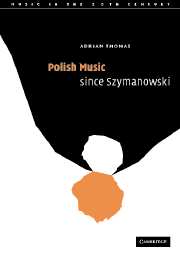Book contents
- Frontmatter
- Contents
- List of musical examples
- Preface
- Acknowledgements
- List of abbreviations
- Part I The captive muse
- Part II Facing west
- Part III The search for individual identity
- Part IV Modernisms and national iconographies
- 11 Pursuing the abstract
- 12 Music and symbolism I: sacred and patriotic sentiment
- 13 Music and symbolism II: vernacular and classical icons
- 14 Emigré composers
- 15 Young Poland
- Part V Postscript
- Appendix 1 Cultural events in Poland, 1953–6
- Appendix 2 ‘Warsaw Autumn’ repertoire, 10–21 October 1956
- Appendix 3 ‘Warsaw Autumn’ repertoire, 1958–61
- Appendix 4 Selected Polish chronology (1966–90)
- Notes
- Select bibliography
- Index
13 - Music and symbolism II: vernacular and classical icons
Published online by Cambridge University Press: 22 September 2009
- Frontmatter
- Contents
- List of musical examples
- Preface
- Acknowledgements
- List of abbreviations
- Part I The captive muse
- Part II Facing west
- Part III The search for individual identity
- Part IV Modernisms and national iconographies
- 11 Pursuing the abstract
- 12 Music and symbolism I: sacred and patriotic sentiment
- 13 Music and symbolism II: vernacular and classical icons
- 14 Emigré composers
- 15 Young Poland
- Part V Postscript
- Appendix 1 Cultural events in Poland, 1953–6
- Appendix 2 ‘Warsaw Autumn’ repertoire, 10–21 October 1956
- Appendix 3 ‘Warsaw Autumn’ repertoire, 1958–61
- Appendix 4 Selected Polish chronology (1966–90)
- Notes
- Select bibliography
- Index
Summary
The relationship between Polish composers and the Roman Catholic faith has had religious, political and social significance, not least in the way in which composers, bolstered by their creative and religious freedom since 1956, gradually took opportunities from the mid-1960s onwards to put music at the centre of the State–Church divide and to explore spiritual issues more openly. In combatting the anti-religious tenets of communism, it might have been expected that composers would also have severed all associations with the secular musical materials appropriated by post-war socialist realism. As has already been observed, however, in the music of Bacewicz, Lutosławski and others, the stylistic bedrock of most immediate post-war music – a kind of Slavonic neo-classicism – had resonances in later decades. As far as folk music was concerned, it seemed to have been consigned to history by contemporary Polish composers, so tainted had it become by association with Stalinism and so out of kilter with avant-garde ambitions. In the late 1960s, however, there were signs in concert music of a renewed interest: Bacewicz's Viola Concerto has folk traces and both Górecki and Kilar were edging in that direction through their moves towards modality and the citation of old Polish music. What ensued was a process of reclamation of the vernacular, a major attempt to cleanse the memory and to reconfigure the significance of folk culture for composers tiring of mainstream modernism.
- Type
- Chapter
- Information
- Polish Music since Szymanowski , pp. 271 - 282Publisher: Cambridge University PressPrint publication year: 2005



